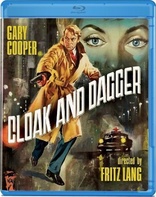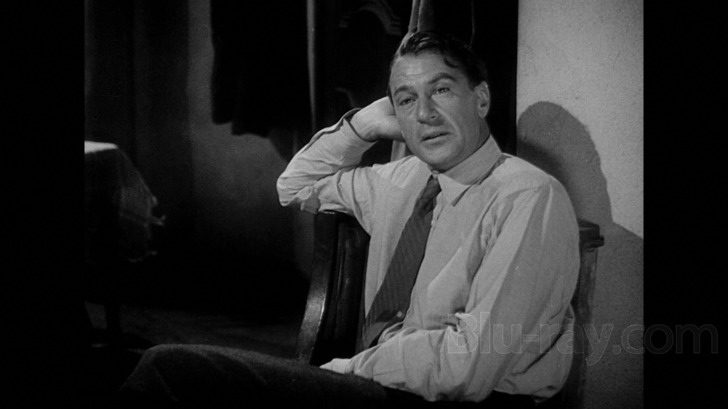Cloak and Dagger Blu-ray Movie
HomeCloak and Dagger Blu-ray Movie 
Olive Films | 1946 | 106 min | Not rated | Apr 30, 2013
Movie rating
6.9 | / 10 |
Blu-ray rating
| Users | 3.0 | |
| Reviewer | 3.5 | |
| Overall | 3.0 |
Overview
Cloak and Dagger (1946)
From legendary director Fritz Lang comes an engrossing spy thriller years ahead of its time. Gary Cooper is a US scientist, parachuted into war-torn Nazi Germany to obtain military secrets. But the deeper he probes, the deadlier his mission becomes...especially when his involvement with mysterious Lilli Palmer catapults him into an intense maelstrom of danger, betrayal and murder.
Starring: Gary Cooper, Robert Alda, Lilli Palmer, Vladimir Sokoloff, J. Edward BrombergDirector: Fritz Lang
| Romance | 100% |
| War | 35% |
| Adventure | Insignificant |
| Thriller | Insignificant |
Specifications
Video
Video codec: MPEG-4 AVC
Video resolution: 1080p
Aspect ratio: 1.37:1
Original aspect ratio: 1.37:1
Audio
English: DTS-HD Master Audio Mono
Subtitles
None
Discs
25GB Blu-ray Disc
Single disc (1 BD)
Playback
Region A (locked)
Review
Rating summary
| Movie | 3.5 | |
| Video | 3.5 | |
| Audio | 3.5 | |
| Extras | 0.0 | |
| Overall | 3.5 |
Cloak and Dagger Blu-ray Movie Review
The spy who loved.
Reviewed by Jeffrey Kauffman May 3, 2013Years ago I was given a very rare kinescope of an old Studio One broadcast from 1958, and it came replete with its original commercials. The show was sponsored by Westinghouse and along with the demonstrations by Betty Furness of the latest in home appliances, there was one truly hilarious yet disturbing advertisement for nuclear power where a nattily dressed gentleman came out and while pointing to a certain item in his hand said, “With just one shoebox of plutonium, we can power a city!” There was an odd love-hate relationship with atomic power that ran rampant through the United States in the 1950s. On the one hand, nuclear power was touted as a cheap way to power a nation increasingly reliant on electricity. On the other hand, the Cold War and acquisition of The Bomb by the Soviets meant that no one was really sleeping all that soundly unless they were retiring to their concrete and steel bomb shelters every night. One of the most fascinating things about 1946’s Cloak and Dagger, a kind of intermittently exciting entry by Fritz Lang that nonetheless holds some very real interest, is how prescient it was about this dichotomy. The film revolves around a rather unlikely hero, a professor who becomes a sort of globetrotting action hero spy who is attempting to ferret who in the smoking ashes of Nazi Germany and Fascist Italy might have access to atomic secrets, but Lang’s leftist sentiments peek out of this film in at least one or two unusually overt ways, despite the fact that the film was drastically edited (and even reshot) after Lang was through with principal photography. Even so, this still has elements of being a rather startlingly pacifist screed that must have confused audiences in 1946 when it was released, just at the time when Americans were celebrating their victory in World War II and before much soul searching had set in about the nuclear bombs dropped on Japan to end that particular part of the conflict. There's little doubt that the film also angered the (right leaning) powers that be at Warner Brothers, for the film was evidently wrested from Lang's control in post production and radically tweaked to remove most (but not quite all) of its supposedly objectionable content.

Cloak and Dagger is supposedly an homage to the Office of Strategic Services (OSS), the superspy outfit that presaged the Central Intelligence Agency in the United States. After a brief prologue where we see freedom fighters getting gunned down by what we assume are Nazi spies, the action shifts to tony Midwestern University where Professor Alvah Jesper (Gary Cooper) is visited by an old fraternity buddy of his, who is now in the OSS. The OSS doesn’t have the expertise to decipher communications they’re getting from overseas that indicate that Nazi Germany may be on the verge of developing an atomic weapon. While Jesper is a bit cagey at first, even with his old friend, the OSS operative tells Jesper that he already knows Jesper is working on the supersecret Manhattan Project, and that Jesper, who also can speak German, is the perfect person to infiltrate Germany to find out how far the Nazis' plans for a bomb have gotten. The first step is reconnoitering with an exiled German scientist named Katerin Lodor (Helen Thimig, Strangers in the Night).
While Jesper is able to meet, albeit briefly, with Lodor and to accede to her wish to return to Germany (she’s being blackmailed), he tells her she should encounter “difficulties” in her research and keep the Allies posted. Before that plan can be put into action, it turns out Jesper has blown his cover, the Nazis are on to him, and Lodor is kidnapped. A rescue effort goes horribly wrong, and Jesper decides he needs to move onto an Italian physicist with whom Lodor had mentioned she’d been collaborating. That sets up the central section of the film, where Jesper works with a group of Italian insurgents, including the comely Gina (Lilli Palmer in her American film debut), to get the Italian physicist Polda (Vladimir Sokoloff) to safety, something the physicist only agrees to if his kidnapped daughter, being held by the Nazis, can be freed as well. A plan is hatched by Jesper’s American liaison, Pinkie (Robert Alda), while Jesper and Gina are told to lie low until the daughter can be liberated.
A number of close calls actually keep Jesper and Gina from really settling down, and they of course start developing romantic feelings for each other as they stay on the run while waiting for Pinkie’s coded message to get to them that Polda’s daughter is safe and that Jesper and Gina can rescue Polda himself. Things once again go spectacularly wrong in a big closing battle, as what seemed to have been a relatively easy endgame turns out to have been ensnared in a major double cross.
Cloak and Dagger is an obviously truncated film (there’s copious evidence that a whole additional reel was actually filmed but ultimately jettisoned), and there are some continuity issues at work within what’s left. But there are some fascinating relics left behind in the debris. Jesper’s big speech when he first talks to his OSS buddy is a doozy, where Jesper laments man’s inability to marshal forces for peace and instead always concentrating on warmongering. Not so very coincidentally for a man of Lang’s philosophical (and religious) bent, the apple makes two very important appearances as Jesper talks about man’s sins in the atomic age.
In terms of the actual film craft, Lang stages some knockout sequences here that are very Hitchcockian. When Jesper is hiding in the back of a truck with the Italian freedom fighters, the truck stalls and a bunch of soldiers start poking around, including in the cargo hold. Later, there’s a terrific sequence where Jesper notices Polda is being followed just when he and Gina are ready to rescue the physicist, and an intense skirmish breaks out. This is easily one of the most Hitchockian sequences outside of the Master’s own oeuvre that I personally can recall, brilliantly edited and absolutely chilling, playing out without a word and with no score.
The film never really totally gels, at least part of which can be attributed to unwanted hands tinkering with it, but it’s memorable nonetheless, buoyed by some great performances, especially by Palmer, who is both tragic and steely in equal measure. The supporting cast is full of colorful players as well. Only Cooper seems slightly out of his element here, but part of that is due to the fact that the character stretches credulity to the breaking point. But the real lingering question many might have while watching Cloak and Dagger will be what Lang might have achieved if his original intentions were left alone.
Cloak and Dagger Blu-ray Movie, Video Quality 

Cloak and Dagger is presented on Blu-ray courtesy of Olive Films with an AVC encoded 1080p transfer in 1.37:1. There are significant improvements to virtually all areas of the image from the old DVD, most especially telecine wobble which has been virtually eliminated (my sense is some program was used that shifts the image frame by frame, as there is one really odd moment early in the film when the Nazi spies are rushing up a spiral staircase and it looks like the entire set folds in on itself for a moment). Contrast is very strong for the most part on this release and the overall image is nicely detailed, both huge improvements over the old DVD. However, there is quite a bit of damage evident throughout this presentation, including some persistent scratches that tend to show up at the sides of the frame. There's also some noticeable print through, again on the sides of the frame, as well as some emulsion damage. One brief insert has a weird blurred image that may be endemic to the source elements.
Cloak and Dagger Blu-ray Movie, Audio Quality 

Cloak and Dagger's lossless DTS-HD Master Audio Mono track sounds surprisingly full for its age, especially with regard to Max Steiner's rousing score, which runs rampant with blaring brass cues. Dialogue comes through very cleanly and the battle scenes have some nice boisterous sounding effects. Fidelity is very good and dynamic range is quite wide.
Cloak and Dagger Blu-ray Movie, Special Features and Extras 

No supplements are offered on this Blu-ray disc.
Cloak and Dagger Blu-ray Movie, Overall Score and Recommendation 

Cloak and Dagger is a fascinating example of an artist's intentions being thwarted by those with a different agenda (which might be something as simple as making money). Still, some of (soon to be blacklisted) Ring Lardner, Jr. and Albert Maltz's original formulation, along with Lang's pacifist vision, manage to sneak—if only barely—into this finished product. If Cooper is a bit ill at ease, and the role itself is patently ridiculous, that's more than made up for by the lovely work done by Lilli Palmer. And the handful of Hitchcockian sequences in this film are among the best little set pieces in Lang's American oeuvre. As a study in the film "business" if not as a film itself, Cloak and Dagger comes Recommended.
Similar titles
Similar titles you might also like

Went the Day Well?
48 Hours
1942

Castle Keep
1969

Age of Heroes
2011

The Inglorious Bastards
Quel maledetto treno blindato
1978

Omar
2013

Charlotte Gray
2001

Eye of the Needle
1981

Night Train to Munich
1940

Lust, Caution
色,戒 / Se, jie
2007

Play Dirty
1969

The Secret Invasion
1964

Bushwick
2017

Man Hunt
Limited Edition to 3000 - SOLD OUT
1941

One of Our Aircraft Is Missing
1942

49th Parallel
1941

The Purple Plain
1954

The Last Hunter
L'ultimo cacciatore
1980

Ballad of a Soldier
Баллада о солдате / Ballada o soldate
1959

Ambush Bay
1966

Topaz 4K
1969